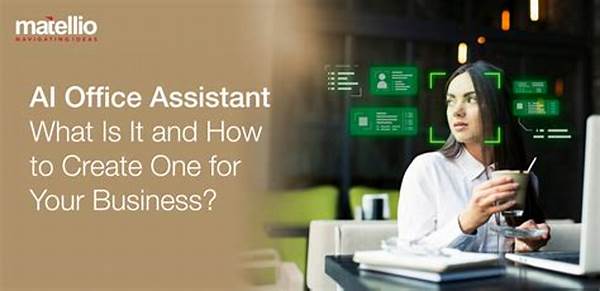- The Rise of AI Office Assistants
- Structured Article: The Future of AI Office Assistants Explained
- Challenges in Implementing AI Office Assistants (H2)
- Overcoming Barriers to Adoption (H3)
- Seven Actions Related to “The Future of AI Office Assistants Explained”
- Discussion on “The Future of AI Office Assistants Explained”
- Brief Explanations on “The Future of AI Office Assistants Explained”
- A Short Article on “The Future of AI Office Assistants Explained”
In the ever-evolving landscape of technology, Artificial Intelligence (AI) stands as a beacon of endless possibilities. Today, AI is not just a buzzword; it’s transforming how businesses operate globally. Among its many transformative impacts, AI is revolutionizing office operations through the development of AI office assistants. These digital marvels are poised to change the way teams interact, communicate, and get work done. Imagine a world where your virtual assistant not only schedules your meetings but also predicts potential scheduling conflicts, suggests the best times to meet, and even provides summaries of your most important emails. Welcome to the future of AI office assistants explained, a future that sings a harmonious blend of efficiency, productivity, and creativity.
Read More : The Future Of Ai-powered Personal Productivity
Office work, known for its repetitive tasks and never-ending emails, has always been ripe for innovation. AI office assistants stand at the forefront of this change, offering a unique selling point for businesses that want to stay ahead. With AI, office assistants perform tasks with increased speed and accuracy, far beyond the capabilities of a human. From managing databases to analyzing complex datasets, they handle tasks with both speed and precision while letting human employees focus on creative and strategic duties. This division of labor not only boosts productivity but also heightens job satisfaction among employees, effectively reducing burnout and turnover rates.
It’s not just about productivity; it’s about drawing interest and generating desire. Imagine a humorous virtual assistant that not only understands your voice commands but can also engage in both formal and informal exchanges, lightening your day with wit and humor. The AI’s extraordinary capability to adapt to various tones and styles of communication, and even entertain while working, elevates the office environment. These assistants act as digital colleagues who never tire, never require paid time off, and yet keep the office running like a well-oiled machine.
For businesses looking to take action, embracing AI office assistants is no longer a matter of if, but when. Seeing the benefits they bring, from cost savings to increased employee satisfaction, adopting these technological wonders makes perfect business sense. Promoting inclusivity and accessibility, AI office assistants can cater to individuals with disabilities, providing functionalities that accommodate various needs. If office harmony and efficiency are some of your business goals, integrating AI office assistants is the definitive step forward.
The Rise of AI Office Assistants
AI is already making substantial inroads in industries worldwide, and office environments are no exception. As technology evolves, the future of AI office assistants explained becomes increasingly vibrant. These assistants are tools of modernization and are as essential as the advent of computers in the last century. Equipped with features such as machine learning algorithms and voice recognition software, AI office assistants are not only mimicking human abilities but surpassing them.
—
Structured Article: The Future of AI Office Assistants Explained
Understanding the AI Office Assistant Phenomenon
The future of ai office assistants explained starts with an appreciation of what these digital laborers bring to the modern office. In a world increasingly dependent on technology, AI office assistants emerge as vital conduits for operational excellence.
AI office assistants operate on complex algorithms designed to optimize workflow. They come equipped with functionalities that transform repetitive tasks into automated processes, effectively allowing human workers to pivot towards more strategic roles. This development is crafted around a core unique selling point—efficiency.
Benefits of AI Integration
The integration of AI in the office is catalyzed by a genuine interest from stakeholders seeking modern solutions. An AI assistant can streamline workflows, resulting in time and cost savings. Machine learning capabilities allow these assistants to adapt and evolve with the company’s needs.
Businesses strive to maintain an edge in a competitive market. The future of AI office assistants explained demonstrates how these assistants facilitate seamless operations, elevating company profiles while enhancing employee engagement.
The Psychological Impact
The desire among employees to work in intelligent, cohesive environments is significant. AI office assistants fulfill this desire by reducing workplace stress and enhancing job satisfaction. This emotional connection underpins the AI assistants’ power.
For employees, the difference is palpable—more focus is placed on creative endeavors while logistical tasks are automated. The result is a healthier work-life balance and reduced burnout, forging a new era of workplace fulfillment.
Technological Advancements
The technological underpinnings of AI office assistants are ever-evolving. With advancements in natural language processing and machine learning, the capabilities of these digital assistants continue to expand. This constant evolution represents not just a future but a continually optimized present.
For businesses seeking effective marketing, AI office assistants serve as ideal subjects. Their deployment can symbolize modernity and innovation, aligning brand identity with technological prowess.
Real-Life AI Assistant Success Stories
Real-world testimonials create compelling narratives. Companies adopting AI office assistants report increased productivity, improved team collaboration, and greater overall satisfaction. These stories provide a persuasive argument for the benefits of AI office assistants in the workplace.
Implementation Strategies
However, how does one take action? Successful implementation hinges on understanding organizational needs. Businesses must consider tailored solutions that align with their specific operational goals. The future of AI office assistants explained not only sheds light on the phenomenon but provides actionable insights for effective deployment.
Challenges in Implementing AI Office Assistants (H2)
Overcoming Barriers to Adoption (H3)
—
Seven Actions Related to “The Future of AI Office Assistants Explained”
Description
As the business landscape transforms through AI technology, understanding the future of AI office assistants becomes crucial. Enterprises are encouraged to explore these virtual aides not merely for their novelty but for the substantial benefits they deliver. The AI assistant phenomenon is underpinned by its ability to automate mundane tasks, optimize resource use, and liberate human employees to engage in creative and strategic thinking.
For businesses embarking on this technological journey, the process isn’t solely about adopting new technology. It’s about catalyzing a cultural shift toward innovation and future readiness. As AI assistants advance, they continue to reshape workplaces by being versatile, efficient, and endlessly evolving.
—
Discussion on “The Future of AI Office Assistants Explained”
Opportunities and Prospects of AI in Offices (H2)
AI office assistants are rapidly becoming integral to modern workplaces. Their growth is indicative of technological trends that suggest a promising trajectory for future applications. The incorporation of AI into daily office operations signifies an unprecedented shift in how business environments function and thrive.
In terms of economic benefits, AI office assistants offer compelling investment returns. The cost of implementation can be outweighed by potential savings on staffing and increased productivity. Businesses that have embraced AI report more streamlined processes and a pronounced reduction in manual errors, paving the way for higher efficiency.
The future of AI office assistants explained is also an exploration of how human roles in the workspace are changing. The delegation of repetitive tasks allows professionals to concentrate on decision-making and crafting innovative strategies. This development nurtures an environment where creativity and productivity flourish in tandem.
Moreover, AI’s intuitive design fosters a workspace that’s both inclusive and dynamic. Office assistants support a variety of tasks, from simple scheduling to complex data analysis. Their adaptability ensures that they can cater to diverse office needs, making them invaluable team members.
Finally, the ongoing evolution of AI technology suggests that what we see today is only the tip of the iceberg. As AI becomes more intelligent and versatile, its potential applications will continue to expand, creating diverse opportunities for those who are ready to embrace this fascinating future.
AI Integration and Employee Experience (H3)
—
Brief Explanations on “The Future of AI Office Assistants Explained”
AI and Employee Productivity (H2)
- AI office assistants streamline repetitive tasks.
- Integration leads to enhanced creativity among employees.
- Assists in minimizing workplace stress.
- Contributes to a healthier work-life balance.
- Improves job satisfaction and employee retention.
- Provides real-time data analysis and insights.
- Supports inclusivity through accessible functions.
- Encourages a forward-thinking culture.
Description
The introduction of AI office assistants to the workplace heralds a new era of productivity and satisfaction among employees. As technology replaces routine tasks, employees are free to focus on strategic projects that require innovation and expertise. This shift facilitates a more engaging and fulfilling work environment, directly impacting job satisfaction and employee retention.
Inclusive technology features ensure that AI office assistants cater to diverse workforces, providing tools that accommodate various needs and preferences. This contributes to a more balanced workplace where every employee has the chance to excel. As organizations continue to embrace these advanced technologies, the future looks bright for offices eager to lead in this techno-centric era.
—
A Short Article on “The Future of AI Office Assistants Explained”
Embracing the AI Revolution in Offices (H2)
The modern office is on the brink of an exciting new transformation, driven by the rise of AI office assistants. Designed to enhance productivity and reduce the burden of repetitive tasks, these AI tools are reshaping workplace dynamics in innovative ways. As businesses wake up to this reality, they must explore the future of AI office assistants explained to navigate the changing landscape successfully.
AI assistants represent a forward step in making workspaces more efficient and streamlined. Transitioning to a setting where AI elements are woven into daily operations means relinquishing traditionally held roles. Employees, rather than focusing on mundane duties, are now able to invest more time into creative tasks and strategic contributions.
Benefits of Advanced AI Solutions (H3)
Businesses adopting AI are noticing a measurable uplift in their competitive positioning. Not only does AI minimize errors and optimize resource use, but it also facilitates an invigorating work environment where individuals thrive. As AI continues to evolve, its applications in offices promise to become even more sophisticated and beneficial.
Expanding on AI’s role in cultivating employee satisfaction, organizations find themselves empowered to achieve long-term goals while promoting a culture of continuous improvement. The deployment of AI office assistants is an investment in future-ready operations that yield compelling returns.
For those questioning the practicality of such technology, one needs to observe the myriad of successful AI implementations. The future of AI office assistants explained proves to be not just a subject of theoretical exploration but a tangible reality with far-reaching benefits.
By aligning technological advancements with human capital, businesses can forge a unique synergy that leads to unprecedented growth. AI office assistants are not mere conveniences; they are essential instruments for navigating future challenges and opportunities.


